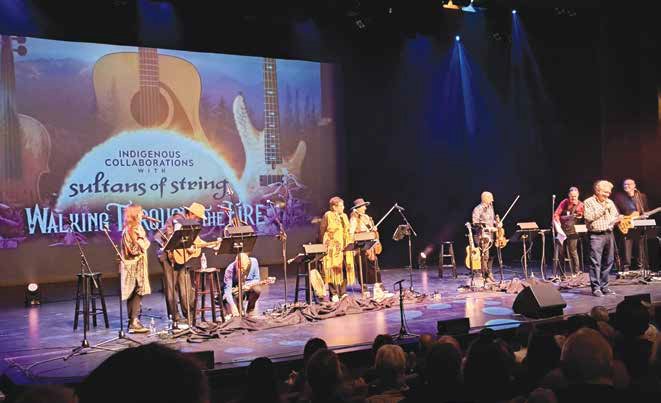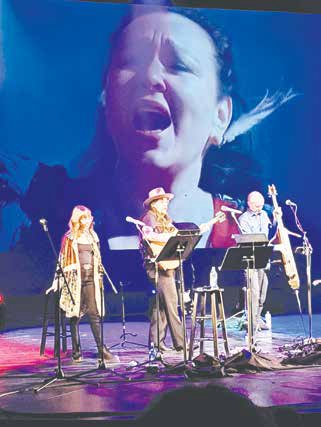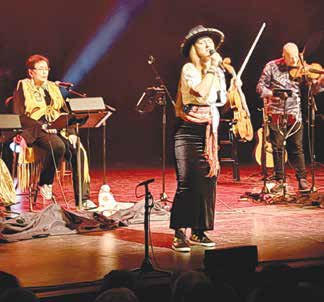
A dynamic array of Indigenous and non-Indigenous musician create a magical collaboration. Photo by Lorne Abugov
Lorne Abugov
On January 19th, a spellbound audience of concertgoers embarked on a personal path forward to reconciliation that was paved with pure gold – musical gold, to be precise. On that cold January evening, a near-capacity crowd of almost 300 hardy musicophiles bore witness to Walking Through The Fire – a critically important musical project performed by the Canadian award-winning ensemble, Sultans of String, together with a veritable who’s who of Canada’s top Indigenous musicians.
The special performance at Meridian Theatre @ Centrepointe brought the magic of musical collaboration between Indigenous and non-Indigenous people to life in a multimedia show that included live and video performances and a range of music from Métis fiddling to Inuit throat singing.
Walking Through The Fire, which arrived in Ottawa in the late stages of a 26-performance Ontario tour, was inspired by recommendations of The Truth and Reconciliation Commission’s “94 Calls to Action” which called for Indigenous and non-Indigenous people to work together as an opportunity to advance reconciliation.
Publicists for the musical collaboration explained that “(a)central theme running through Walking Through The Fire is the need for the truth of Indigenous experience to be told before reconciliation can begin in earnest. Embedded in the title of the show is the energy of rebirth: fire destroys, but it also nourishes the soil to create new growth, beauty, and resiliency. Walking Through The Fire ensures that we emerge on the other side together, stronger and more unified.”

Performers from many nations, including the Dene, Blackfoot, Metis, Inuit and Tsm’syen wove together a brilliant tapestry of Indigenous music with the backing of the Sultans of String. Photo by Lorne Abugov
Early in the show, Métis musician Alyssa Delbaere-Sawchuk electrified the audience with Chanson de Riel, the lyrics to which, according to Métis legend, were written by martyred hero Louis Riel in his final days before his execution in 1885. What began as a deep, slow lament erupted into a lively fiddler’s reel midway through the tune that had the audience bouncing in their seats.
Among the many memorable moments in Walking Through The Fire was Shannon Thunderbird’s performance of her powerful and chilling ballad, Lost and Found. Thunderbird, a West Coast Tsm’syen Elder Singer-Songwriter, wrote the song shortly after the discovery on May 27, 2021 of the bones of 215 Indigenous children in a mass grave on the grounds of a residential school in Kamloops, B.C.
“I wrote Lost and Found to acknowledge the fact that with tangible evidence Canadians could no longer deny what we have been saying for over a century,” Thunderbird explains in liner notes to the Walking Through The Fire CD.
The multimedia aspect of the event was evident midway through the first set, beginning with a video performance of Our Mother, The Earth by Alberta-based Dr. Duke Redbone, a Chippewa/Anishinaabe Elder and poet. The song, set against a backdrop of Canada’s scenic landscapes, combines powerful spoken, chanted and sung lyrics.
According to Dr. Redbone: “The song was inspired by the idea that every country has a national anthem, but there is no anthem for the Earth. If people included an anthem for the Earth along with their national anthem at every event, it would serve to acknowledge our identity, values and sense of pride in the fact that we are all children of the Earth.”
Video was also the medium to introduce the song Ko and performer Leela Gilday, a Dene singer and songwriter from the Northwest Territories, who sang to the accompaniment of live music on stage from Sultans of String and Indigenous musicians Forrest Eaglespeaker, a Prairies Blackfoot singer songwriter and Nevada Freistadt. The alluring imagery of Northern terrain and Gilday’s traditional Dene dress on the giant video screen combined to create one of the most visually striking segments of Walking Through The Fire.
The sheer diversity of the musical offerings was underlined by strong performances from Ojibwe/Finnish singer Marc Merilainen (Nadjiwan) who began the evening with his composition, A Beautiful Darkness; Crystal Shawanda, an Ojibwe/Potawatomi singer-songwriter, and her coming of age song The Rez, and Ottawa-based Inuit throat singers Kendra Tagoona and Tracy Sarazin who performed I Am Happy, a traditional Inuit song known as a pisiq, written by a North Baffin Island man to welcome the spring and celebrate living.
Not to be forgotten are the Sultans of String quartet whose prodigious efforts onstage during Walking Through The Fire represented only the leading edge of the band’s hard work in pulling together this inspiring and innovative musical collaboration for our times.
You can watch String’s bandleader Chris McKhool discuss the Walking Through The Fire project in a special video at https://youtu.be/0A5V6Q1Iabg. And a full recount of the production is available by scanning the QR Code below.








